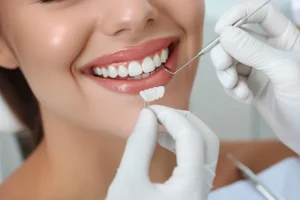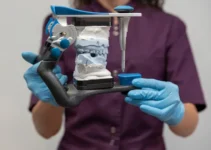Dental veneers are increasingly popular as a cosmetic solution for achieving that perfect, star-quality smile. Made from thin but durable materials, veneers are carefully crafted to cover the front surface of teeth, effectively masking discolorations, gaps, or irregular shapes. In this article, we explore how veneers work, their benefits, and what you can expect during the treatment process. Whether you’re seeking to enhance your smile for personal or professional reasons, understanding the role of dental veneers can guide you in making an informed decision.
What are Dental Veneers?
Dental veneers are a popular cosmetic dental solution used to enhance the appearance of teeth. These thin, custom-made shells are designed to cover the front surface of teeth, providing a natural and attractive appearance. Veneers are commonly made from porcelain or resin composite materials and are bonded to the teeth to improve aspects such as color, shape, size, or length.
Modern dental technology has made veneers more accessible and effective than ever before. They can be an excellent option for those looking to achieve a dazzling smile without undergoing extensive dental work. In the sections below, we will delve deeper into what dental veneers are, the various types available, and the procedure for getting them.
Definition and Overview
Dental veneers are wafer-thin, custom-made shells crafted from tooth-colored materials and designed to cover the front surface of teeth. Unlike crowns, which encase the entire tooth, veneers only cover the visible part of the tooth, making them a less invasive option for many patients. They are primarily used for cosmetic purposes but can also provide structural benefits by reinforcing weakened teeth.
One of the significant advantages of veneers is their ability to mimic the light-reflecting properties of natural teeth. This characteristic, combined with the use of high-quality materials, allows veneers to blend seamlessly with natural teeth, making them virtually indistinguishable from the real thing. Patients often opt for veneers to correct issues such as discoloration, chips, cracks, gaps, and minor misalignments.
Types of Dental Veneers
There are mainly two types of dental veneers: porcelain veneers and composite resin veneers. Each type has its unique set of advantages and considerations, making it essential for patients to consult with their dentist to determine the best option for their specific needs.
Porcelain veneers are known for their durability and ability to mimic the natural translucency of tooth enamel. They are stain-resistant and can last anywhere from 10 to 15 years with proper care. The process of getting porcelain veneers typically involves multiple visits to the dentist, as they need to be custom-made in a dental lab.
Composite resin veneers, on the other hand, are usually completed in a single visit. The procedure involves the dentist applying and sculpting the resin onto the teeth. While they are less expensive than porcelain veneers, composite resin veneers may not last as long and are more prone to staining.
Procedure for Getting Dental Veneers
The process of getting dental veneers typically involves several steps, starting with an initial consultation. During this meeting, the dentist will evaluate your oral health, discuss your aesthetic goals, and determine whether veneers are the right solution for you. If you are deemed a suitable candidate, the dentist will proceed with a detailed treatment plan tailored to your needs.
The next step involves preparing the teeth. This may include removing a small amount of enamel from the front surface of the teeth to make room for the veneers. The amount of enamel removed is usually minimal, but it is necessary to ensure a proper fit and natural appearance. Once the teeth are prepared, the dentist will take impressions that are sent to a dental lab, where your custom veneers will be fabricated.
Once the veneers are ready, typically within a few weeks, the dentist will schedule a fitting appointment. During this visit, the veneers will be temporarily placed on your teeth to check for fit and color. Adjustments can be made as needed before the veneers are permanently bonded to your teeth. Once bonded, any excess cement is removed, and final adjustments are made to ensure a perfect fit.
After the procedure, it’s essential to maintain good oral hygiene practices and visit your dentist regularly to ensure the longevity of your veneers. With proper care, dental veneers can provide a beautiful, natural-looking smile for many years to come.
If you’re interested in enhancing your smile or learning more about other cosmetic dental procedures, be sure to check out our additional articles and resources.
Benefits of Dental Veneers
Dental veneers have transformed the field of cosmetic dentistry by offering an effective solution to enhance the appearance of teeth. These thin shells, typically made of porcelain or composite resin, are custom-made to fit over the front surface of teeth. They provide numerous benefits, making them a popular choice for those looking to improve their smiles. Veneers are not only aesthetically pleasing but also contribute to the overall health and functionality of teeth.
One of the significant advantages of dental veneers is their ability to correct a wide range of dental issues. Whether you have discolored, chipped, or misaligned teeth, veneers can provide a uniform and natural-looking solution. Moreover, the application of veneers is relatively quick, often requiring only two visits to the dentist. This efficiency adds to the appeal, making veneers a convenient option for many patients.
Additionally, dental veneers offer long-lasting results. With proper care, veneers can last anywhere from 10 to 15 years, making them a worthwhile investment. They are also stain-resistant, which helps maintain a bright and white smile over the years. This durability, combined with their aesthetic benefits, makes dental veneers an excellent choice for individuals looking to improve both the look and function of their teeth.
Enhancing Your Smile
One of the primary benefits of dental veneers is their ability to significantly enhance your smile. Veneers can address a variety of cosmetic issues, including gaps between teeth, irregularly shaped teeth, and severe discoloration that does not respond to whitening treatments. By covering these imperfections, veneers create a more symmetrical and attractive smile.
The process begins with a thorough examination and consultation to determine the best approach for each patient. The dentist works closely with the patient to select the appropriate shade and shape of the veneers to ensure a natural and harmonious appearance. As a result, veneers can make your smile look not only brighter but also more aligned and aesthetically pleasing.
Moreover, veneers provide immediate results. Once applied, the transformation is instant, helping patients gain confidence in their appearance. The improved smile can positively impact various aspects of life, from personal relationships to professional interactions. Thus, veneers are an excellent option for anyone looking to quickly and effectively enhance their smile.
Durability and Strength
Another significant advantage of dental veneers is their durability and strength. Made from high-quality materials such as porcelain or composite resin, veneers are designed to withstand the rigors of daily use. Porcelain veneers, in particular, are known for their stain resistance and durability, making them a long-term solution for many dental issues.
Veneers are also resistant to chips and cracks, which adds to their longevity. Proper care, including regular dental check-ups and good oral hygiene, can ensure that veneers remain in excellent condition for many years. This durability makes veneers a cost-effective choice in the long run, as they require minimal maintenance and offer long-lasting results. Additionally, veneers can strengthen the underlying tooth structure. By providing a protective layer over the tooth, veneers can help prevent further wear and tear. This added strength is particularly beneficial for teeth that are already weakened or damaged, offering both aesthetic and functional improvements.
Minimal Invasive Procedure
One of the reasons why dental veneers are so popular is because the procedure is minimally invasive compared to other dental treatments. The application process typically involves removing a small amount of enamel from the surface of the tooth to make room for the veneer. This ensures a snug and natural fit without significantly altering the tooth structure.
The procedure is usually completed in two visits. During the first visit, the dentist prepares the teeth and takes impressions to create custom veneers. In the second visit, the veneers are bonded to the teeth using a strong adhesive. This relatively simple and quick process makes veneers a convenient option for those looking to improve their smile without undergoing extensive dental work.
Moreover, the minimal invasiveness of the procedure means there is little to no discomfort during and after the application. Patients can resume their normal activities almost immediately, making the experience hassle-free. This ease of the procedure, coupled with the remarkable results, makes dental veneers an attractive option for many.
In conclusion, dental veneers offer a range of benefits, from enhancing your smile to providing durability and strength, all through a minimally invasive procedure. If you found this article helpful, be sure to check out our other articles on dental health and cosmetic dentistry to learn more about how you can achieve your best smile.
Cost and Maintenance of Dental Veneers
Dental veneers are a popular cosmetic dentistry option that can significantly enhance the appearance of your smile. However, their cost and maintenance are important considerations for anyone thinking about getting them. Understanding the expenses involved and how to properly care for veneers can help you make an informed decision. Let’s explore the factors affecting the cost, the role of insurance, and the best practices for veneer maintenance.
The cost of dental veneers can vary widely based on several factors, including the material used, the complexity of the procedure, and geographic location. Maintenance is also crucial to ensure the longevity of veneers, requiring a commitment to good oral hygiene and regular dental visits. By delving deeper into these aspects, you can better understand what to expect and how to maximize the lifespan of your veneers.
Factors Affecting the Cost
The cost of dental veneers can be influenced by a range of factors. Firstly, the material used plays a significant role. Porcelain veneers, for example, are generally more expensive than composite resin veneers because they offer a more natural appearance and greater durability. Additionally, the process of creating and applying porcelain veneers is more complex and time-consuming.
Secondly, the number of veneers you need will affect the overall cost. A full set of veneers for multiple teeth will be more expensive compared to just getting one or two veneers. Similarly, the geographic location of your dentist’s office can impact the cost. Dental procedures tend to be more expensive in urban areas compared to rural settings.
Lastly, the experience and skill level of the dentist can also influence the cost. Highly experienced dentists who specialize in cosmetic dentistry may charge more for their services, but their expertise often translates to better results and a more comfortable experience.
Insurance Coverage
When it comes to insurance, it is important to understand that dental veneers are generally considered a cosmetic procedure. As a result, most dental insurance plans do not cover the cost of veneers. However, there can be exceptions. Some insurance plans may provide partial coverage if the veneers are deemed necessary for medical reasons, such as to restore a damaged tooth.
It is always a good idea to check with your insurance provider before proceeding with the treatment. They can offer detailed information about what is covered under your specific plan. Additionally, some dental offices offer financing options or payment plans to help manage the cost of veneers, making them more accessible to a wider range of patients.
If your insurance does offer partial coverage, be sure to get a detailed estimate from your dentist and submit a pre-authorization request. This can help you understand how much you’ll need to pay out of pocket and avoid any surprises later on.
How to Take Care of Your Veneers
Proper maintenance is essential to ensure the longevity of your dental veneers. First and foremost, it is important to maintain good oral hygiene. This includes brushing your teeth at least twice a day with a non-abrasive toothpaste and flossing daily. Proper oral care helps prevent plaque buildup, which can affect the appearance and health of your veneers.
Avoiding foods and drinks that can stain your veneers is also important. Coffee, tea, red wine, and certain berries can cause staining over time. If you do consume these items, it’s a good idea to rinse your mouth with water afterward. Additionally, avoid biting on hard objects like ice or using your teeth as tools, as these actions can cause your veneers to chip or crack.
Regular visits to your dentist are crucial for the maintenance of your veneers. During these visits, your dentist will check the condition of your veneers and ensure they are still well-bonded to your teeth. Professional cleanings help remove plaque and tartar that regular brushing might miss, keeping both your natural teeth and veneers in top condition.
Lastly, consider wearing a mouthguard if you grind your teeth at night. Grinding can cause significant wear and tear on your veneers, reducing their lifespan. A custom-made mouthguard can protect your veneers and your natural teeth, allowing you to get the most out of your investment.
By understanding the costs involved, navigating insurance options, and committing to proper maintenance, you can make the most of your dental veneers. For further insights and more detailed information on dental care, be sure to explore our other articles.
Common Questions About Dental Veneers
Is the Veneer Procedure Painful?
The question of whether the veneer procedure is painful is quite common among patients considering this cosmetic dental treatment. Generally, the veneer procedure is not painful. Local anesthesia is typically administered to ensure that the patient remains comfortable during the preparation and placement of the veneers. Most patients report feeling minimal to no discomfort during the procedure.
After the anesthesia wears off, there might be some sensitivity or mild discomfort, but this is usually manageable with over-the-counter pain relief medications. The sensation doesn’t last long and is often described as minor and temporary. Most patients find that the aesthetic and functional benefits of veneers far outweigh any short-term discomfort they may experience.
Additionally, modern advancements in dental technology and techniques have significantly reduced any potential discomfort associated with veneer placement. Minimally invasive procedures and the use of high-quality materials contribute to a smoother, more comfortable experience for patients.
Can Veneers Fall Off?
The concern of veneers falling off is understandable, especially when considering one’s investment in cosmetic dentistry. Veneers are designed to be a permanent solution, and when placed by an experienced dental professional, they should remain securely attached for many years. The key to the durability of veneers lies in the meticulous preparation and bonding process. Dentists use strong dental adhesives and etching techniques to ensure that the veneers are firmly bonded to the natural teeth. However, it is essential for patients to follow good oral hygiene practices and avoid habits that may compromise the integrity of the veneers, such as biting on hard objects or using teeth as tools.
Occasionally, veneers can dislodge due to improper bonding, trauma, or excessive wear. If a veneer does come off, it is crucial to contact your dentist immediately. With proper care and maintenance, the risk of veneers falling off is minimal.
How Natural Do Veneers Look?
One of the primary reasons patients opt for veneers is their ability to mimic the look of natural teeth. High-quality veneers are crafted from materials like porcelain or composite resin, which closely resemble the translucency and color of natural enamel. When properly placed, veneers can be indistinguishable from natural teeth, providing a seamless and aesthetically pleasing smile.
The expertise of the dentist plays a crucial role in achieving natural-looking results. A skilled dentist will take into account various factors such as the patient’s facial features, the color of adjacent teeth, and the desired outcome to create veneers that complement a patient’s overall appearance. Custom shading and contouring further enhance the natural look of veneers.
Moreover, advancements in digital dentistry, including computer-aided design and manufacturing (CAD/CAM), have made it possible to create highly precise and custom-fitted veneers. This technology ensures that each veneer is tailored to match the patient’s unique dental anatomy, resulting in a natural and beautiful smile.
Considering dental veneers? Understanding these common questions can help you make an informed decision about your dental care. Be sure to explore other articles to learn more about veneers and other cosmetic dentistry options available to you.
Dental Veneers: The Ideal Solution for a Movie Smile
Dental veneers are a popular cosmetic dentistry option for those looking to achieve a flawless smile. Here are some frequently asked questions to help you understand how veneers can transform your teeth.
What are dental veneers and how do they improve your smile?
Dental veneers are thin shells made from porcelain or composite resin that are custom-made to fit over the front of your teeth. They are designed to improve the aesthetic appearance of your teeth by concealing imperfections such as discoloration, chips, gaps, or misalignment. Veneers provide a smooth, radiant finish and a natural tooth appearance, enhancing your overall smile and boosting your confidence.

My name is Salman Kapa, a 73-year-old expert in bone regeneration and dental implantology. With decades of experience in the field, I am dedicated to advancing our understanding of oral health and hygiene. Through my research and writing, I aim to contribute to the development of innovative solutions in dental care.




